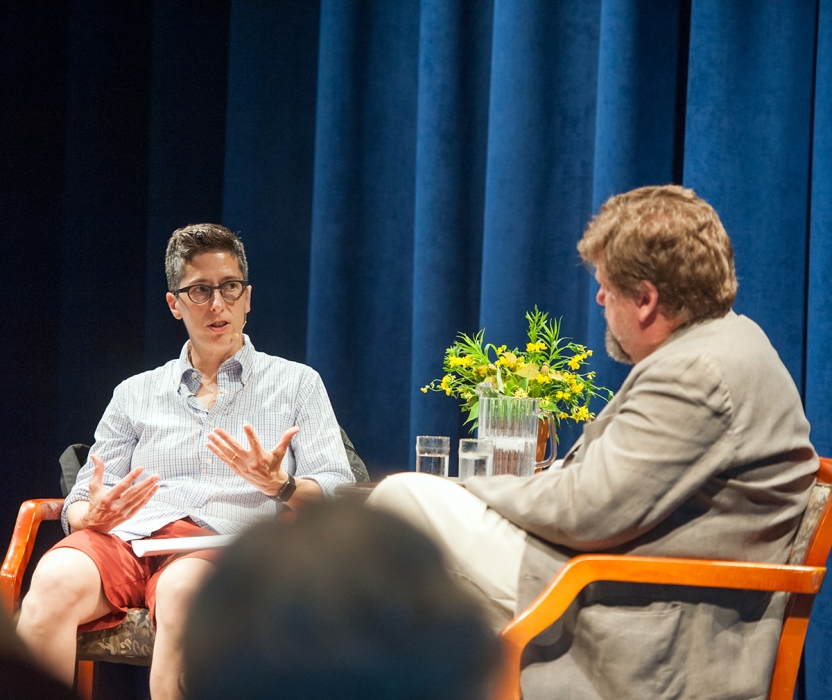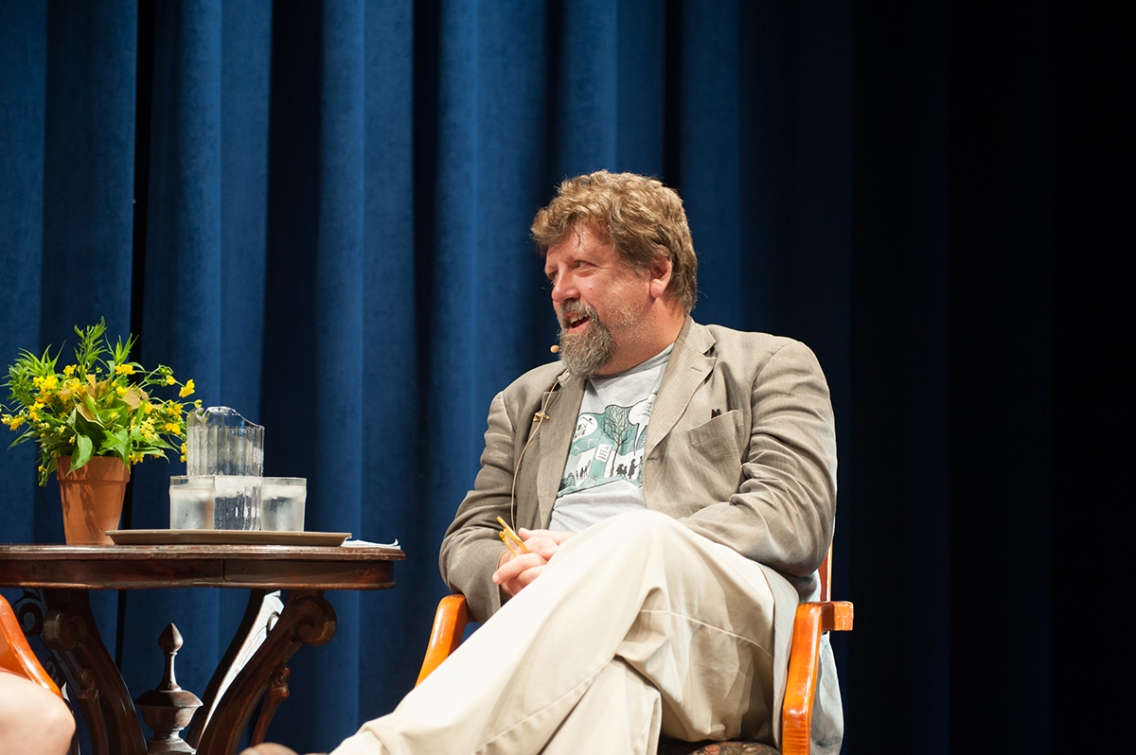Alison Bechdel and Oskar Eustis Give the Drew Memorial Lecture at Bread Loaf

MIDDLEBURY, Vt. – Two people whose recent work has transformed the theater world joined together for an evening of conversation at the Vermont campus of the Middlebury Bread Loaf School of English. Alison Bechdel, the celebrated cartoonist and author whose graphic memoir Fun Home: A Family Tragicomic was the basis for the Tony-award-winning musical Fun Home, shared the stage with Oskar Eustis, artistic director of The Public Theater in Manhattan. Under Eustis’s leadership, both Fun Home and the smash hit Hamilton premiered at the Public Theater.
The two artists appeared before a capacity crowd at Bread Loaf’s Little Theater on June 29 for the annual Elizabeth Drew Memorial Lecture, which Bread Loaf Director Emily Bartels described as a chance to hear from creative thinkers whose work “is changing the face of literature and the arts in a major way.”
Eustis, a longtime Bread Loaf faculty member, led the wide-ranging discussion, which traced Bechdel’s creative history, from childhood to their collaborative work at the Public Theater. Bechdel first made her mark with Dykes to Watch Out For, a self-syndicated comic strip she drew from 1983-2008. Over the years, her cartoons have appeared in The New Yorker, Slate, McSweeney’s, the New York Times Book Review, and Granta.

Bechdel said that she always loved to draw, but that throughout her childhood she almost exclusively drew men. “By the time I came out at age 19 as a lesbian, that started to strike me as a little odd,” she laughed. “So I had to intentionally teach myself to draw women.”
Part of how she learned to draw women was to think of them as lesbians. “In those days, it was such a different world – I can’t even tell you. It’s hard to convey how much more fraught gender was. I didn’t even think of myself as a woman; I thought of myself as a lesbian.”
She said she began drawing cartoons featuring “silly, crazy lesbians,” which turned into Dykes to Watch Out For. Initially Bechdel drew the strip to entertain friends, but at the time she was volunteering for a feminist collective newspaper, which started to publish her comics. Gradually she pushed the strip beyond gay papers into alternative weeklies, including the Vermont-based Seven Days. “Now that seems not so surprising,” she said, “but then it was a big deal – to get people in general to read a cartoon about lesbians was really asking a lot.”
In 2006, Bechdel published her first memoir, Fun Home: A Family Tragicomic, which Time magazine named its Best Book of the year. The graphic novel delves into Bechdel’s complex upbringing with a closeted bisexual father, who Bechdel believes committed suicide. Much of the evening’s discussion explored how the story was adapted to the stage by playwright and lyricist Lisa Kron and composer Jeanine Tesori. The musical adaptation of Fun Home won five Tony awards, including “Best Musical” in 2015.
The core of the story, Bechdel notes, is best summed up by a line in the show that was taken from an interview she gave several years ago: “My father and I grew up in the same small Pennsylvania town, and we were both gay, and he killed himself and I became a lesbian cartoonist.”
That line also became the organizing principal of the play, said Eustis. “When Lisa [Kron] found that, it was the thing that made us say, ‘Oh, that’s the contradiction we’re trying to resolve – I was like him and I’ve ended up totally different from him.”
Eustis said the big challenge in creating this adaptation was answering the question: What is the heart of this that genuinely honors what the book is? “We were all so crazy about the book and so sure that whatever we did had to feel like it was correctly in response to what your search was in the book.”
Eustis asked Bechdel why she agreed to adapting her deeply personal book into a musical. Bechdel, who had previously turned down an offer for film rights to Fun Home, said that she was somehow more comfortable with the idea of a stage adaptation. She knew and admired the work of Lisa Kron and thought if anyone could do a good job, it would be her. She said her decision was helped by her own naiveté about all the ways it could have been a terrible musical. “I was really lucky – it worked out well.”
The annual Elizabeth Drew Memorial lecture at Bread Loaf honors the former Bread Loaf faculty member whose nearly half-century career as a writer included poetry, literary scholarship, drama, and numerous essays. Past Drew lecturers have included Marjorie Garber, Oskar Eustis, Tony Kushner, Seamus Heaney, and Bread Loaf’s Michael Wood and Isobel Armstrong.
With reporting by Stephen Diehl; Photos by Jennifer Kiewit

